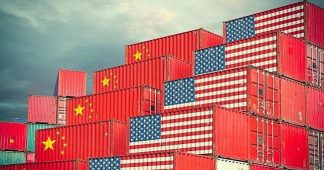By Glenn Diesen
19 Aug, 2020
Despite some very obvious flaws, President Trump still presents a viable option for many Americans left behind economically by the new world order and a Democratic party that doesn’t even acknowledge there’s a problem.
Why would Americans vote for Trump? The former reality TV star is vulgar, loud-mouthed, has a loose relationship with facts and does not behave in a presidential manner by any stretch of the imagination.
Domestically, society is polarising under his administration, and the electorate fears that the country is heading in the wrong direction. Internationally, allies are alienated and adversaries are provoked, while crucial international treaties are collapsing left and right. Yet, the tendency by the political media establishment to dismiss his voters as xenophobes and imbeciles is a mistake.
As with all US elections, the economy tends to be the central question. The case for Trump is that he appears to be the only alternative to the status quo at a time when neoliberal economics is collapsing. The political class recognises that many Americans were left behind during globalisation, yet it has been generally thought that this could be resolved within the neoliberal format. This is a mistake, because the collapse of American manufacturing – to the dismay of blue-collar workers – was largely by design.
In the late 1980s and early 1990s, the American economy underwent a radical shift as society was to be shaped almost solely by the market. The low-profit activities in supply chains were outsourced to low-wage countries, and the Western multinational companies absorbed and consolidated control over research, development, marketing and intellectual property rights.
Trade agreements focusing on liberalising trade and extending intellectual property rights were designed for a radical international division of labour. In the new international division of labour of the digital era, US technologies could saturate foreign markets and in return open up its manufacturing to competition to the rest of the world. Simply put, US economic leadership rested on a division of labour where the US would invent the smartphone and the Chinese could manufacture it.
The strategy was a gift for the digital industry, but blue-collar workers in the manufacturing industry were thrown under the bus. The metropolitan regions on the west coast and the east coast boomed, while the rest of the country was hollowed out. The US government has not responded in any meaningful way to the growing socio-economic polarisation of the country.
Traditionally, the political Left would advocate for wealth redistribution as a limitation on free trade, while the political Right would seek to protect communities and traditional values from unfettered market forces. Under the neoliberal consensus, the political class is largely impotent as the market is expected to resolve all societal disruptions.
Making matters worse, the international division of labour that favoured the tech industry has appeared to collapse. China gradually climbed global value chains and is challenging the technological and economic leadership of the US. The smartphones of the future will be invented and manufactured by China. American leadership no longer appears viable under the liberal format for globalisation.
Trump tapped into these powerful undercurrents in American society and economy, which ushered him into the White House. How has Trump performed? Poorly. His policies are inconsistent, contradictory, and they often appear to solely serve his vanity or re-election efforts. The faltering economic recovery always rested on artificial stimulus, Trump has immersed himself in the “swamp” he’d intended to drain, and there seems to be an absence of strategic thinking in his engagement with the wider world.
In 1998, almost two decades before Trump won the presidential election, the American philosopher Richard Rorty made a prediction about the neoliberalism path of his country: “Members of labor unions, and unorganized and unskilled workers, will sooner or later realize that their government is not even trying to prevent wages from sinking or to prevent jobs from being exported. Around the same time, they will realize that suburban white-collar workers –themselves desperately afraid of being downsized– are not going to let themselves be taxed to provide social benefits for anyone else. At that point, something will crack
“The nonsuburban electorate will decide that the system has failed and start looking around for a strongman to vote for–someone willing to assure them that, once he is elected, the smug bureaucrats, tricky lawyers, overpaid bond salesmen, and postmodernist professors will no longer be calling the shots… Once the strongman takes office, no one can predict what will happen.”
Trump’s possible re-election will not be the result of his ability to resolve the socio-economic problems, rather it will be the failure of the opposition to even recognise them. The political Left, committed to neoliberal economics, is reluctant to consider economic reforms. The result has been a meaningless and destructive political platform consisting of divisive identity politics, anti-Russian conspiracy theories, and a focus on personalities rather than content. The Joe Biden-Kamala Harris ticket perfectly embodies the empty vessel that the Democratic Party has become.
The reluctance to recognise why people voted for Trump will thus be instrumental to his possible re-election.
* Glenn Diesen, is an Associate Professor at the University of South-Eastern Norway and an editor at the Russia in Global Affairs journal. Follow him on Twitter @glenndiesen











